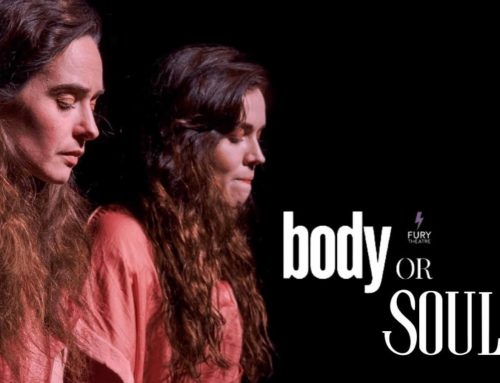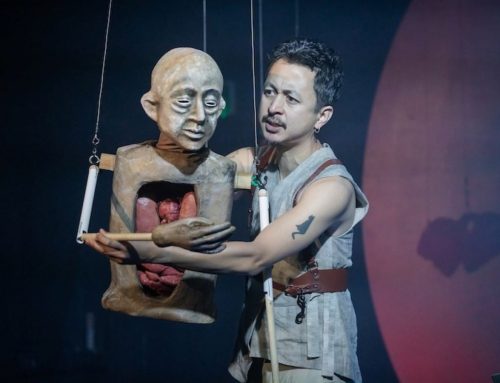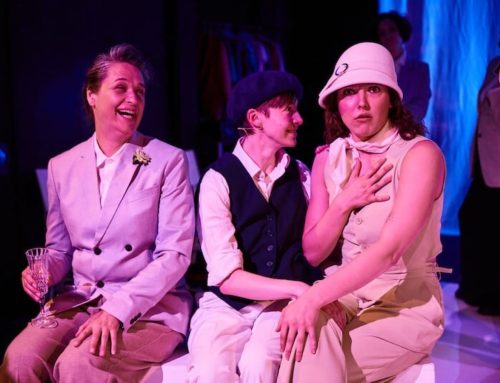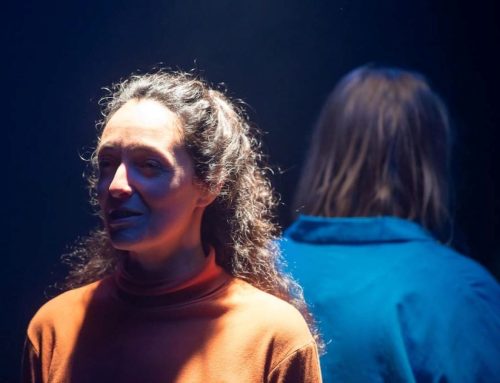The ninth annual 96 Festival, Omnibus Theatre’s month-long “celebration of queerness and theatre” kicked off with Joe Carstairs, a verbose, polemical piece of metatheatre that wraps itself up in navel-gazing knots attempting to find parallels between current gender politics and the life story of a 20th century queer icon. The play sees a queer playwright, intrigued by the apparent parallels between their subject’s life and their own, set about dramatizing an iconic life. Handily placed clothes racks on the stage facilitate quick costume changes.
Fast forward to the end of the 96 festival and we have George, another metatheatrical attempt to find parallels between current gender politics and the life story of a queer icon from a previous century. And yes, the play sees a writer, intrigued by the apparent parallels between their subject’s life and their own, set about a semi-biographical dramatization. Oh, and a handily placed clothes rack on stage facilitates quick costume changes.
Spooky coincidence or creative programming on the Omnibus Theatre’s part? One suspects the latter. The parallel clothes racks certainly make the stage managers’ task easier. In any event, Léa Des Garets’ leaner and more personal three-hander George is by far the more satisfying of the two offerings.
George’s eponymous protagonist is George Sand (played by des Garet), the pen name of prominent and prolific French writer Amantine Lucile Aurore Dupin. Active from the 1830s to the 1870s, Sand’s unconventional lifestyle, including her practice of dressing in men’s clothing and adopting masculine behaviours, scandalises the French press and challenges gender norms. Historical records attest to Sand’s numerous romantic relationships with men, most notably the composer Frédéric Chopin and the poet Alfred de Musset.
Queer theatre-maker Léa des Garets places Sands in (what may be a wholly fictional) romantic relationship with renowned contemporary female French actor and “artiste of the masses” Marie Dorval (Iniki Marinao). The situation feels truthful even if the historical verité remains uncertain. Conor Dumbrell emotes prodigiously (he runs the gamut from the merely camp to the screaming queen) in multiple roles as George’s male interlocutors.
Marseille 1839. Sands, bedecked in black overcoat and men’s trousers and braces, has writer’s block and bills to pay (dressing as a man has bought her more freedom than cash). Offstage Chopin’s piano practice is getting her down, her wailing kids demand attention, and her ex-husband wants a bigger pension. Onstage Sand’s lover-slash-muse Dorval persists in demanding the beleaguered writer pen a play for Dorval to star in. Letters arrive from her editor complaining he has read more press articles about her many lovers than he has pages of her new novel. Things, in sum, are not looking good.
Sand’s elects to write a money-making play about a girl raised as a boy by her nefarious and malevolent grandfather. The girl grows up unaware of her true gender, believing herself to be a young man named Gabriel. On discovering she is in fact female Gabriel is forced to work out for herself what a woman really is. The plot thickens when Gabriel falls in love with her male cousin Astolphe. Determined to protect her inheritance Gabriel tries to uphold the ruse that she is a man, seemingly enticing Astolphe into a same-sex romance.
Cue extended extemporising on the fluidity of gender and the arbitrary nature of societal gender roles, with a sword fight or two thrown in. Inevitably Gabriel meets resistance from the audience of the time (her editor describes it as “a little lady story with cross-dressing”) and is never produced. The point that Gabriel, Sands (and by extension de Garet) are making is that females can never be simultaneously “free, educated, and a woman”.
des Garet’s witty script time shifts between the writing of the play and events unfolding in the play itself. Their performance as George evinces naturalistic charisma. Mariano is great too as the demanding Dorval who wonders why Sands thinks she is “better than other women”. Dumbrell mostly plays it for laughs. Fair enough but one wishes he would dial it all down a little. Director Rute Costa places some of the action in dreamy silhouette behind white canvases, neatly evoking the blurred lines throughout between fiction and reality.
George is a play about a woman dressing as a man, composed by a woman trying to understand why she dresses as a man, written by a queer women musing about gender. Plays do not come much more ambitiously meta that this. It is a neat contrivance, one which the writer and director mainly pull off.
Writer: Léa des Garets
Director: Rute Costa
More Recent Reviews
Playfight. Soho Theatre.
Writer Julia Grogan’s breathtakingly assured debut play arrives at Soho Theatre following stellar reviews at the Edinburgh Fringe and [...]
All The Happy Things. Soho Theatre.
Naomi Denny’s three-hander comedy-drama All The Happy Things covers familiar themes within a recognisable premise. A grieving protagonist comes [...]
Telly. Bread and Roses Theatre.
The challenge with absurdist comedy is that many people do not find it funny. Laughing at the sheer weirdness [...]






